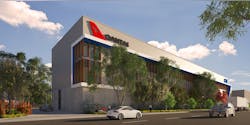Qantas Group Engineering Academy Moves Ahead to Supercharge Australian Engineering Training
Trainees at the Qantas Group Engineering Academy will be able to choose between studying in Brisbane or Melbourne with both cities selected as Academy locations.
Training facilities will be located close to airports in Brisbane and Melbourne where Qantas and Jetstar have a strong engineering presence, allowing for a mix of classroom and real-world learning environments.
Across both sites the Academy will train up to 300 engineers a year from 2025 and will be run in partnership with Aviation Australia. It is part of the Qantas Group’s major investment in recruitment and training, which will see 8,500 highly skilled aviation jobs created to support its growth over the next decade.
Qantas Group CEO Alan Joyce said the Academy meant many more trainees would be able to access the world-class engineering training programs the National Carrier was known for.
“Qantas has a proud history of having some of the best engineers in the world and we want to make sure it stays that way,” Joyce said.
“Training is in our DNA. We’re delivering around 2 million hours in training in 2023 alone, and like our Pilot Academy, this will build our pipeline of talent for both the Qantas Group and Australian aviation more broadly.
“We’ve already had almost 1000 people register their interest in joining the Academy and it’s a great opportunity for people looking at a career in aviation.”
The Qantas Group expects to hire around 200 of the Academy graduates a year, with others expected to find work in Defence and other parts of the aviation industry. All trainees will be employees of the Qantas Group, meaning they will be paid to learn.
Aviation Australia CEO Bill Horrocks said the Qantas Group Engineering Academy will be a key contributor to the Australian aviation sector helping to address the engineering skills shortfalls.
“Selecting Aviation Australia as Qantas’ training partner for the Academy recognizes the important role that we play as the nation’s premier aircraft maintenance engineering training provider. Our training combines job-ready skills and education to translate into employment outcomes,” Horrocks said.
“Our training facilities will provide students with the day-to-day experience of a working hangar, as well as supervised training on aircraft, for a seamless transition into operational environments.”
Federal Minister for Skills and Training Brendan O’Connor welcomed the education and training investment in the aviation industry.
“Australia is facing skill shortages in many sectors of our economy, including aviation, creating challenges for businesses like Qantas and the economy in general,” O’Connor said.
“Thousands of new workers are needed in the aviation industry, creating significant opportunities for people to get jobs that are in demand, and the government supports investment in skills to develop the aviation engineers of the future.
“The Albanese Government is committed to working with industry to find solutions to the skills and workforce challenges they face.”
Queensland Minister for Training and Skills Development Di Farmer said that having Aviation Australia operating the Qantas Engineering Academy in Brisbane and Melbourne shines a light on Queensland’s expertise.
“That will continue to excel once the Academy is up and running,” Farmer said.
“The Queensland Government is committed to creating good jobs, and with Academy operating in Brisbane and Melbourne will help address both Queensland’s and our nation’s aviation industry skills shortages.”
Acting Victorian Minister for Industry and Innovation Steve Dimopoulos said Qantas’ decision to base its Engineering Academy in Victoria highlights the state’s competitive advantage for producing 30 per cent of Australia’s engineering graduates and supporting high-tech training opportunities.
“Choosing Melbourne supports local jobs in our aviation sector and backs the next generation of engineering talent in Victoria,” Dimopoulos said.
Traineeships include classroom and practical lessons on engines and aircraft systems. Once ready, trainees move to some supervised training on aircraft.
The Academy’s curriculum will draw on Qantas Group and Aviation Australia’s engineering training expertise, and we’re continuing to work with unions and industry on the structure of training.
Construction is underway on a new flight training facility in Sydney which will train up to 4,500 Qantas and Jetstar pilots a year from early 2024. When open, Qantas will conduct flight training in Melbourne, Brisbane, Perth and Sydney, in addition to the Qantas Group Pilot Academy in Toowoomba and Longreach Cabin Crew training centre in Sydney.
The Group is aiming to significantly increase the representation of women in engineering roles, similar to what it does through its pilot academy, in order to expand access to talented people. Around seven per cent of engineers at Qantas are female and expressions of interest in the academy are currently running at about 16 percent female.
